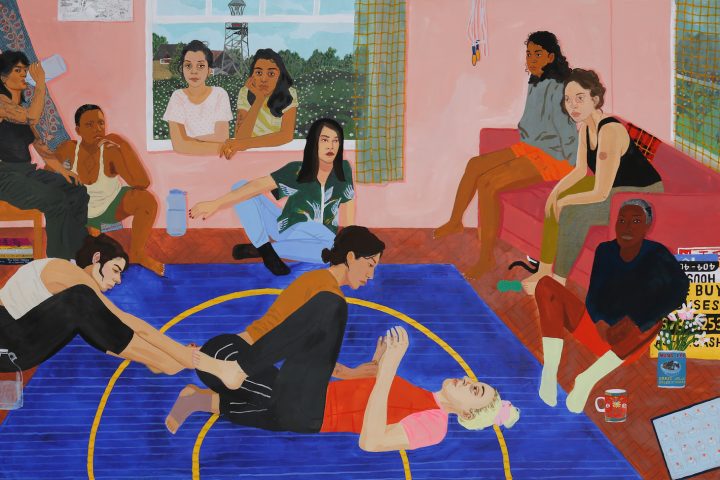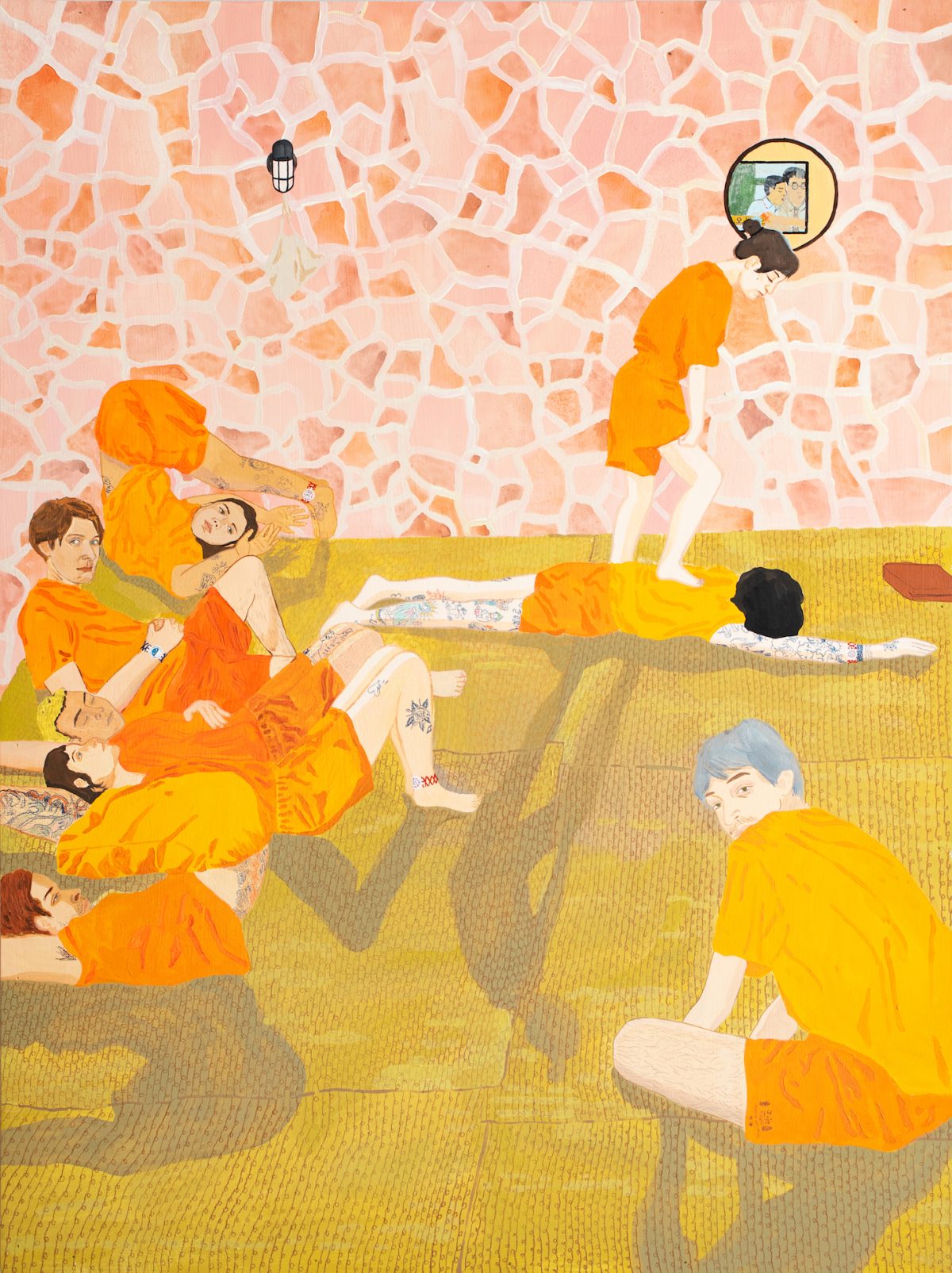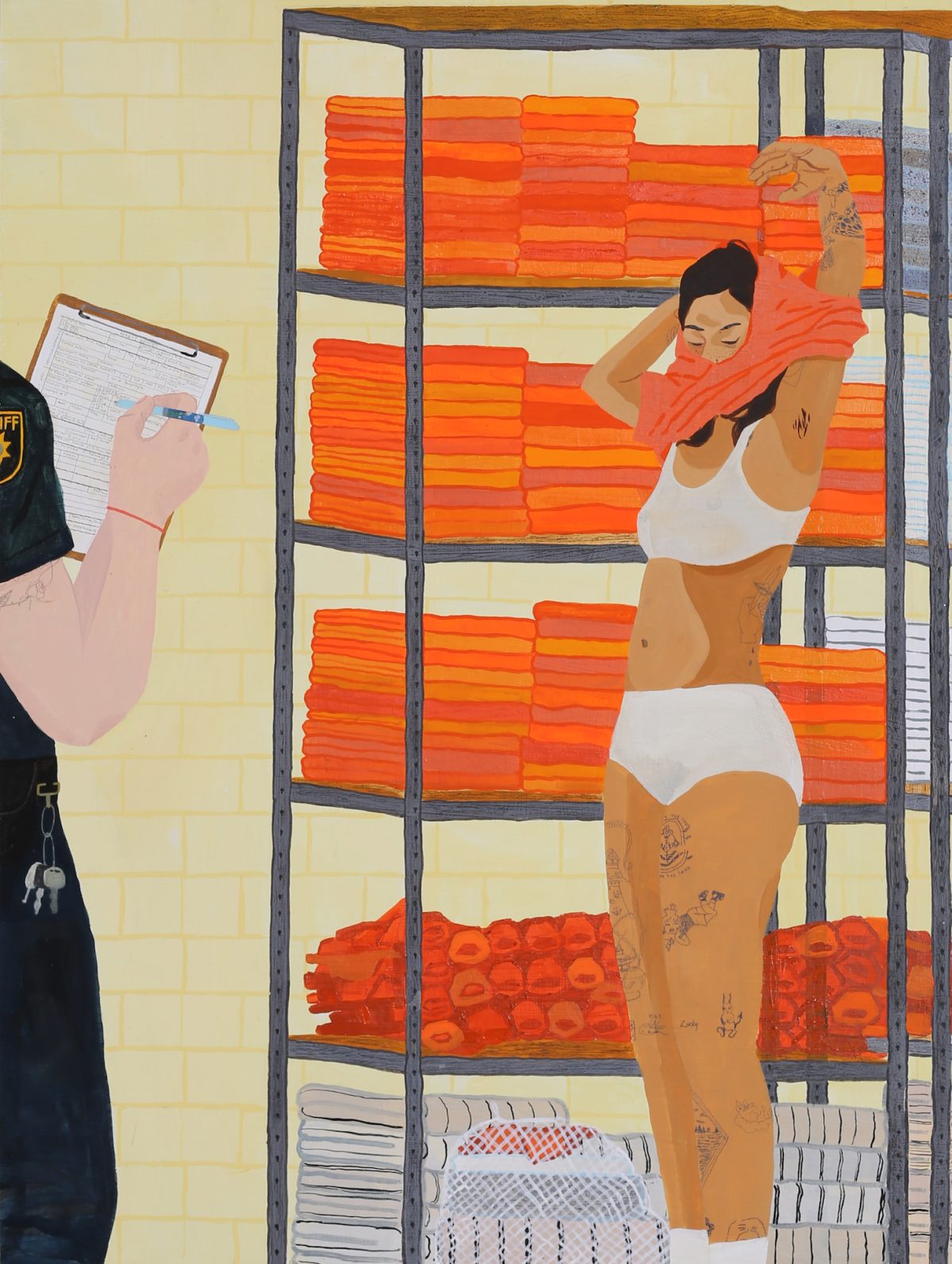
LEXINGTON, Ky — Created during a year that most spent in relative isolation, the seven paintings in Dianna Settles: Olly Olly Oxen Free at Institute 193 (open through today) assert the importance of congregation and touch to our shared human existence. With one (physically) small exception, the works depict people interacting with each other, sometimes as a pair, but more often as a group: a gathering of friends in a living room, a handful of bathers at a Korean spa, a crowd of protesters clashing with police. Indeed, not all of the scenes Settles recreates are pleasant, but that seems to be the point: for better or worse, we are undeniably yoked in our collective experience of being human.
Settles paints not from life but from memory; her works are highly composed reconstructions of personal experiences, of which her own figure forms an integral part, her gaze frequently directed at the viewer. In “We must exist more and heavier // we are learning discipline everyday, bench pressing, jiu-jitsu training, training for our future study” (2021), she portrays seven people in a living room, casually seated on sofas or the floor, around herself and another person, interlocked in a jiu-jitsu hold on a lapis lazuli-colored mat with circular markings denoting the practice area. Two others stand outside the first-floor window, their arms resting lazily on the sill or propping up a bored visage, looking not at the wrestlers but at us. In fact, none of the characters in this scene seem to be focused on the action, reinforcing the idea that Settles is more interested in capturing the essence of a time and place than in the verity of a singular event.

Settles devotes her attention to both text and texture, using colored pencil to make painstakingly minute marks over the acrylic paint. In the aforementioned painting, one can easily read the logo on a shirt pocket, the spines of books stacked on the floor (for instance, Kaneko Fumiko’s The Prison Memoirs of a Japanese Woman), and the scrawled handwriting on a drawing on the back wall (“WE MUST ALL EXTEND TO EACH OTHER IN THIS GAME”). Faces and bodies are relatively flat, but the tattoos that adorn them are replicated in exquisite detail, as are the decorative elements on ceramic mugs and patterned fabrics. Such choices seem to play on the peculiar nature of nostalgia, in which we can easily and vividly recall specific items from our memories — a grandmother’s wingback chair or the cut-glass dish in which she kept hard candies — even as faces begin to fade and dates and places get jumbled and blurred.
In the vertically oriented “Deep stretching, deep pulling, deep sweating, deep breathing ( A feeling that at moments hinted at rivers running backwards )” (2021), Settles and a smaller cohort gather in the massage room of Jeju Spa, a traditional Korean bathhouse (jjimjilbang) outside of Atlanta, Georgia, where she currently lives. Clad in the spa’s cotton orange pajamas, the eight young adults lounge on citron-colored hemp mats surrounded by pink salt-stone walls; some sleep, others stretch; one stands and presses a foot into another’s back to give a massage. A monitor playing a Korean television show is reflected in a circular mirror on the wall.

A curious silence pervades all of the works: the figures are physically close, yet none engage in conversation, and two of the men actually direct their attention toward the viewers who exist outside of the painting. The focus is not the interior lives of any of the tattooed individuals, but the larger communal experience — a tableau of the social rituals of a particular demographic and place.
The orange hue of the pajamas is replicated in another vertical work of the same size — “Sometimes it feels like it is over and it’s not. Sometimes it feels like it has just begun and it’s over.” (2021) — only it is a prison uniform, worn by the artist while a police officer fills out an arrest report on a clipboard. Both jail and spa have their own intake rituals, including a specified wardrobe that marks one as part of the institution, if only temporarily. While the two entities are radically different in their functions, Settles suggests that both are sites of human interaction with processes that require us to play defined roles — be it guard, inmate, patron, or employee — that often divide us rather than emphasize our common humanity.

Settles makes the comparison more forcibly with “Nothing is not borrowed & hunger doesn’t compromise together we made this place together we can leave it” (2021), the largest work in the show. The work combines two panels — one portraying her arrest at a protest and the other depicting a small delegation of women at Jeju Spa — in a single wood frame with pyrographed illustrations of flora native to Georgia. In the first panel, police physically overwhelm the protesters and use the force of their bodies to make arrests; in the second, pairs of women scrub each other’s naked bodies (seshin is the notoriously vigorous Korean exfoliating process). Physicality and the body permeate both peace and protest.
By juxtaposing these two scenes and surrounding them with images of plants and flowers — elements of the natural world that exist beyond human struggle — Settles contains them within a broader narrative of time and nature. However fresh and raw incidents of state oppression might feel, such scenes have played out again and again throughout history. But so, too, have instances of compassion and nurturing, and we have all been involved in each to some degree. By situating herself within these situations, Settles simultaneously gains distance from them and, with it, a complex and nuanced perspective.

Dianna Settles: Olly Olly Oxen Free continues at Institute 193 (193 North Limestone Street, Lexington, Kentucky) through July 31.
0 Commentaires